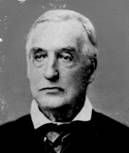Today, famous Confederate spy Belle Boyd is captured by Federal authorities and imprisoned in the Old Capital Prison in Washington, DC. Just eighteen years old, Boyd had captivated Federal officers with her charm while supplying important military intelligence to General Thomas “Stonewall” Jackson and his forces in the Shenandoah Valley. Jackson had penned a personal note of thanks to her for the information she passed along to him before the Battle of Front Royal and she had been awarded the Southern Cross of Honor.
Boyd’s fellow prisoners in the Old Capital Prison soon include a number of citizens from the city of Fredericksburg, Virginia. In retaliation for the seizure of two Unionists in Richmond by Confederate authorities, Federal troops seize nineteen of Fredericksburg’s most prominent citizens, who are subsequently imprisoned in the Old Capital Prison. Among these detainees are four members of Fredericksburg Baptist Church: jurist George H.C. Rowe, carpenter William H. Norton, Lewis Wrenn, and the pastor, the Reverend William F. Broaddus.
Broaddus had come to the Fredericksburg Church in the summer of 1853 after having gained a reputation for his pro-missions stance during the anti-missionary controversy that had raged throughout Virginia and Kentucky in the 1830’s. Upon coming to Fredericksburg he inspired the church to build a handsome Gothic building, completed in 1855, that became one of the most prominent buildings in the city. Now, at 61 years of age, Broaddus finds himself once again in a whirlwind. Writing in a diary that he would maintain throughout his imprisonment, Broaddus comments on today’s events:
Tuesday, July 29, 1862. While walking today near the Exchange at the corner of Main [Caroline] and Commerce Street in Fredericksburg, I was stopped by Captain Scott of the Federal Army and informed that by the order of General King, I was under arrest to be taken at once to General King’s headquarters. I asked the privilege of taking leave of my family, but this was declared to be unmilitary. I, however, met with Willie Slaughter on the street, and requested him to go to my residence for my trunk, to be brought to General Patrick’s headquarters at Farmer’s Bank. Here I was kept about 30 minutes. During this half-hour my wife and Hattie came to take leave of me, a trial I would fain have escaped…
Arrived at the Lacy house, General King’s headquarters. I was detained for more than an hour, and at 11:30 o’clock left on the cars for Aquia Creek, where I took the government boat for Washington. On the boat I met with Mr. and Mrs. William Gill and Mrs. Peyton Conway, on their way to Baltimore. This is fortunate for my comforts for besides giving me pleasure by their company, they permitted me to share their snack, which constituted the only refreshment I met with until I arrived at my prison. I found my fellow townsmen, C.C. Wellford, Thomas F. Knox, James McGuire, B.T. Gill and James H. Bradley, occupying one room. William Barton, who belonged to this mess, had been paroled and is in Baltimore. They had with them a Mr. Garnett of Spotsylvania County, a prisoner of war, who politely vacated his bunk and found a place in another room. By this means I secured the very great privilege of messing with my neighbors and friends.
Broaddus arrives at the Old Capital Prison the following day and remains incarcerated until September 24, 1862. He maintains his diary throughout this time period, recording the experiences of his imprisonment and writing anecdotes about prison life and his fellow captives. In late August Broaddus requests, and is given permission, to travel without military guard to Richmond in effort to arrange a prisoner exchange.
“Friday, August 29 …At 6:00pm left for Richmond on a parole for 10 days with a view to get an exchange of state prisoners. Belle Boyd went down with us on a government boat.”
“Monday, September 1. …Reaching Siken’s Landing at sundown Spent the night at Mr. Siken’s. Delighted to breathe Virginia air.”
“Tuesday, September 2. Went to Richmond in Major Allen’s carriage with Belle Boyd and Major Fitzhugh, and also Mr. H.C. Hathaway, a sick soldier released. Put Hathaway at Medical College. Saw many old friends. Took Powhatan as my headquarters, and took lodging at Mr. Blevin’s. Found my son, John, ill with typhoid fever at Miss Farrar’s. Hope he is feeling better.”
“Saturday, September 6. In the course of the morning I succeeded in completing my work, obtained an order for the discharge at once of the 25 prisoners, and at 4:00pm left for Fredericksburg on my return to prison, but with the pleasing prospect of opening the doors of the prison to all my friends of Fredericksburg.”
Bureaucratic snafus delay the anticipated release, but Broadus is finally able to pen on Saturday, September 27:
“The day was spent in receiving the congratulations of our friends on our return to our homes. The whole affair seems to have drawn our several family circles much nearer, and created a bond among them which I trust will never be broken. May we all prove ourselves worthy of a country in whose behalf we have permitted to suffer wrong!”
Broaddus’ hoped for return to a tranquil and civil life in Fredericksburg is short lived. In less than three months Fredericksburg experiences the full devastation and horror of war. Broaddus’ home, just half a block from his church, is rendered uninhabitable, forcing him to live the life of a refugee in Charlottesville for the remainder of the war.
Sources: “Prison Diary of W.F. Broaddus,” archives of Virginia Baptist Historical Society; S. J. Quinn, History of Fredericksburg, Richmond Va.: Hermitage Press, 1908; Oscar Darter, The History of Fredericksburg Baptist Church, Fredericksburg Virginia, Richmond, Va.: Garrett & Massie, 1960; image from Fredericksburg Baptist Church website (link)
Article written by Dennis Sacrey, President of the Virginia Baptist Historical Society, and Church Administrator, Fredericksburg Baptist Church



